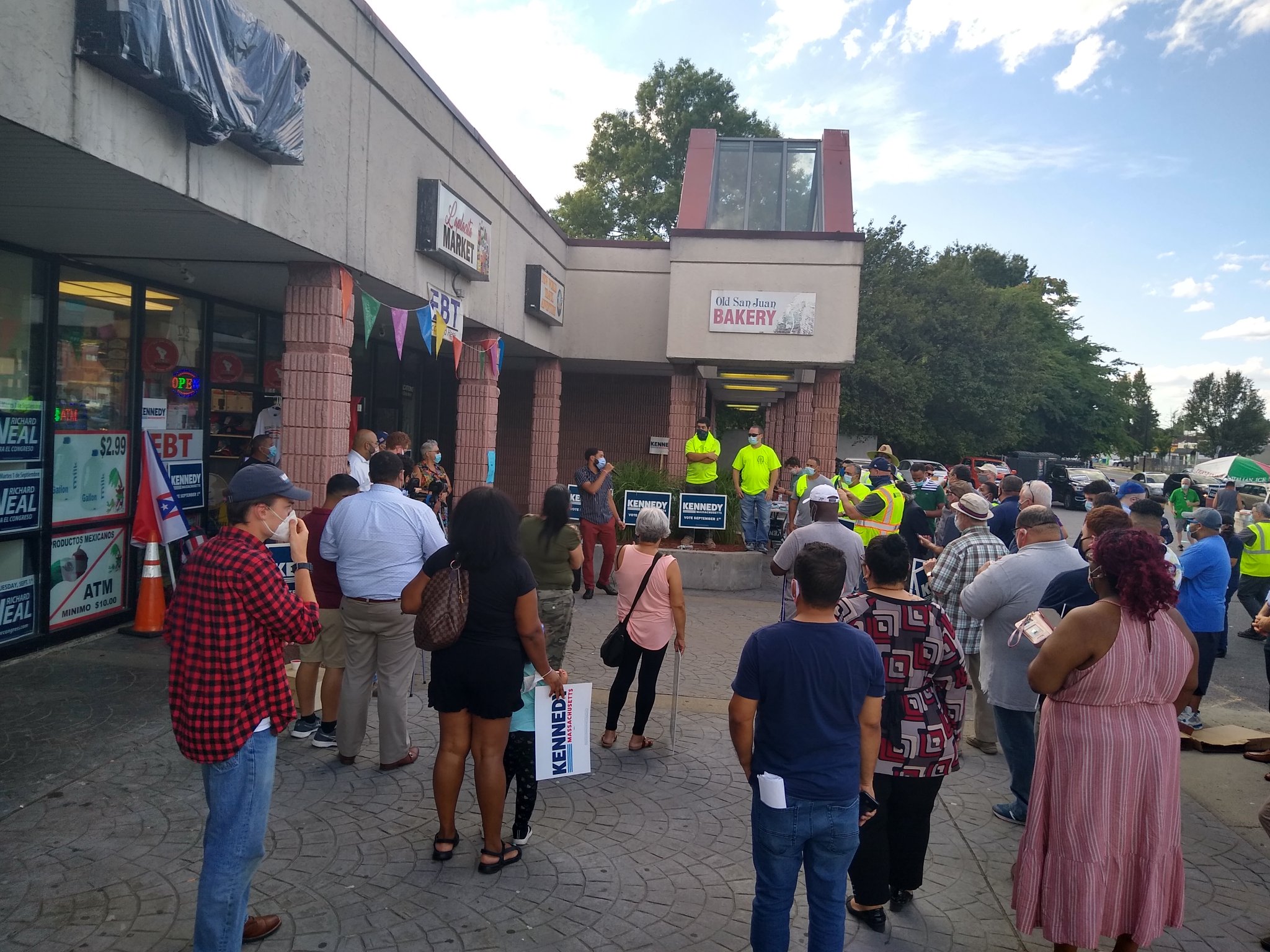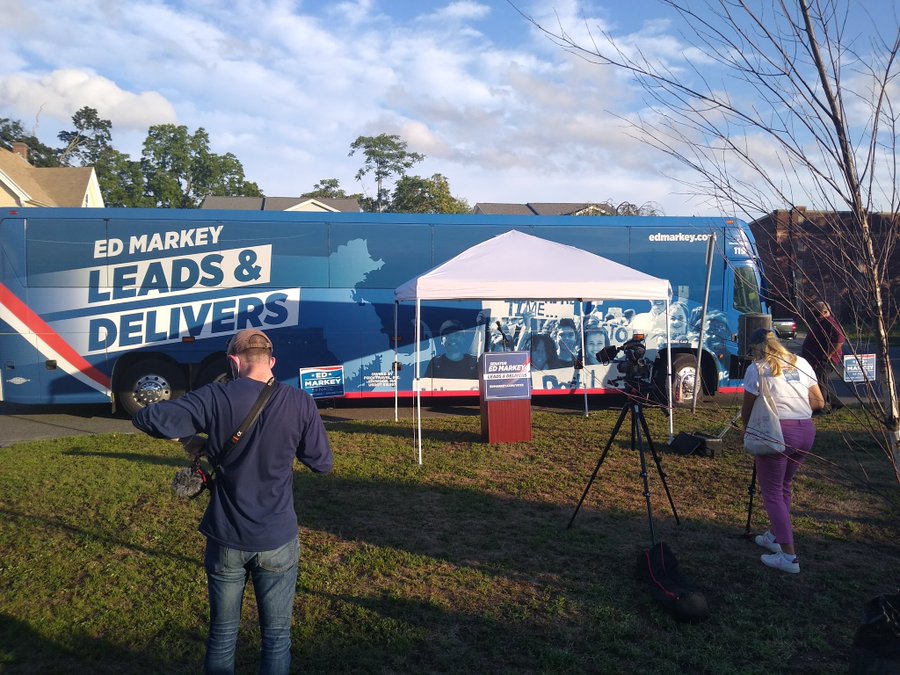Our One Hundredth: Will It Come down to City & Suburb?…
LONGMEADOW—The Markey Bus steamed into the parking lot here at Williams Middle School, almost the geographic center of this noted Springfield suburb. A number of local luminaries, Green New Deal enthusiasts and a mostly socially-distant crowd were there waiting for him. Senator Ed Markey mostly spoke about racial social justice. Those who spoke before him enumerated his work on a host of issues, not least of which was legislation and advocacy on the environment.
Markey would visit Springfield’s North End later that day. Yet, earlier in the week and a few miles down the road, his rival in the Senate race would pull a larger crowd downtown. After a quick stop in Forest Park—which mostly forms the border between Springfield and Longmeadow—Newton Congressman Joseph Kennedy, III met supporters on Court Square, rallied them and posed for photos. In only a week’s time, even here in Western Massachusetts, the shape of the race is becoming clear.
Trailing in several polls, Kennedy is betting on a surge in urban turnout in the commonwealth’s cities. Meanwhile, Markey remains strongest in more affluent suburbs. Neither has completely conceded these areas to the other, but the breakdown is clear.
For much of this race, the arguments have been around style of representation. Despite the overwrought insistence from the Markeyverse that Kennedy is to their man’s right, the two Democrats largely align on the issues.
Many Massachusetts political navel-gazers believe that Markey has banked a considerable vote among young voters, party activists, and those with college degrees. They have already voted either via mail or early voting.
In Longmeadow, that seemed to largely be the case. Many here had already voted, although hardly everybody. There were the normal exhortations to keep getting out the vote and reaching last-minute voters.
A parade of speakers feted Markey’s record. State Rep Brian Ashe touted Markey’s responsiveness. Longmeadow Democratic Town Committee Chair Michele Marantz highlighted Markey’s environmental record. The LTC’s chair emerita and Democratic State Committee Candy Glazer pointed to the senator’s work on gun control—and Elizabeth Warren’s endorsement.
“I really do feel good, but I’m going to be going to go 24 seven. All gas no brake,” he said in an interview in Springfield later.
The advantage Markey has built with more affluent voters who largely voted early defines Kennedy’s task. Not only must he win primary day voters, but he must maximize their numbers.

A different Carlos Gonzalez revs up the crowd for Joe Kennedy in early August (WMP&I)
Thus his itinerary over the last 10 days. It has brought him to Gateway Cities to juice the vote. Early in August he held a large—by COVID era standards— rally in the North End. Kennedy has enjoyed some noted establishment Latino support in Springfield throughout the campaign. But the throngs that day seemed encompass more than that relatively small clique.
When Markey held his North End rally outside Medina’s Supermarket, he had some prominent Latino supporters with him. State Representative Carlos Gonzalez, as is his wont, dialed things up to a 15 as emcee. Elizabeth Cardona, who once ran former Governor Deval Patrick’s Western Mass office, offered a forceful defense of Markey.

So cometh the Markey-mobile to the North End. (WMP&I)
Markey himself spoke about economic opportunity for all. He likened his family’s story to the black and brown families that now largely occupy the neighborhoods in Malden and Lawrence where the Markeys have their roots.
Yet, the audience seemed more monochromatic than one might expect in the heart of Hispanic Springfield.
After his Court Square rally last week, Kennedy discussed why he felt he was resonating in communities like Springfield and how he would represent them in the Senate.
“It’s that voices of much of Western Massachusetts aren’t actually being fully represented,” he said. A mantra throughout his campaign has been a promise to show up.
The needs of Holyoke, Pittsfield or Springfield are not necessarily unique, he said. However, “the solutions aren’t cookie cutter, you have to build up local credibility, you have to put the right people together.”
Before his Court Square stop that day, Kennedy and his wife Lauren stopped at the JFK Eternal Flame in Forest Park, something his uncle Edward Kennedy did whenever he was in town. The stop was not on his itinerary, but it was something many warmly received once WMP&I tweeted out a snapshot of the visit.
.@joekennedy & @laurenkennedyMA visit the JFK eternal flame in Forest Park in #Springfield. #mapoli pic.twitter.com/VIMoaSKPzJ
— Matt Szafranski (@MSzafranski413) August 26, 2020
Whether it is that promise to be here of Kennedy mystique, the congressman’s pitch crosses racial lines.
His campaign has also pulled in fairly large groups of people in historically black Mason Square. He received a warm reception Monday at Russ’s, a noted Springfield breakfast nook that draws a whiter, somewhat working-class crowd. There was similar response at Lids Live Well, a small health club in Chicopee, and even chatting with random motorists as he walked around Aldenville in Chicopee.
That presence and desire for something new—at least for US Senate—was the common thread.
Urban Hampden County has not seen as high a early ballot return rate, suggesting a larger turnout on primary day. There and other cities in the commonwealth may be where Kennedy makes his last stand even as Markey is hunting for those votes too.
“Western Massachusetts is very important to me,” he told WMP&I Saturday. “I’ve spent a lot of time out here, because I care about them. And I care about the issues that they care about.”

